#include <DataDependenceEdge.hh>


Public Types | |
| enum | DependenceType { DEP_UNKNOWN = 0 , DEP_RAW = 1 , DEP_WAR = 2 , DEP_WAW = 3 , DEP_TRIGGER = 4 } |
| enum | EdgeReason { EDGE_REGISTER , EDGE_MEMORY , EDGE_FUSTATE , EDGE_OPERATION , EDGE_RA } |
Public Member Functions | |
| DataDependenceEdge (EdgeReason edgereason, DependenceType deptype, TCEString data, bool guard=false, bool certainAlias=false, bool tailPseudo=false, bool headPseudo=false, int loop=0) | |
| DataDependenceEdge (EdgeReason edgereason, DependenceType deptype, bool guard=false, bool certainAlias=false, bool tailPseudo=false, bool headPseudo=false, int loop=0) | |
| DataDependenceEdge (const DataDependenceEdge &other) | |
| DataDependenceEdge (const DataDependenceEdge &other, bool invertLoop) | |
| virtual | ~DataDependenceEdge () |
| TCEString | toString () const |
| TCEString | toString (MoveNode &tail) const |
| ObjectState * | saveState (const MoveNode &tail, const MoveNode &head) |
| DependenceType | dependenceType () const |
| EdgeReason | edgeReason () const |
| bool | isFalseDep () const |
| bool | guardUse () const |
| bool | certainAlias () const |
| bool | tailPseudo () const |
| bool | headPseudo () const |
| bool | isBackEdge () const |
| int | loopDepth () const |
| bool | isGPREdge () const |
| bool | isRegisterOrRA () const |
| bool | isWAW () const |
| bool | isRAW () const |
| const TCEString | data () const |
| bool | operator== (const DataDependenceEdge &other) const |
| void | setData (const TCEString &newData) |
 Public Member Functions inherited from GraphEdge Public Member Functions inherited from GraphEdge | |
| GraphEdge () | |
| GraphEdge (const GraphEdge &edge) | |
| virtual GraphEdge * | clone () const |
| virtual | ~GraphEdge () |
| virtual int | edgeID () const |
| virtual TCEString | dotString () const |
| int | weight () const |
| void | setWeight (int w) |
Static Public Member Functions | |
| static void | printStats (std::ostream &out) |
Static Public Attributes | |
| static int | regAntidepCount_ = 0 |
Private Types | |
| enum | EdgePropertyFlags { EPF_GUARD = 1 << 0 , EPF_CERTAIN_ALIAS = 1 << 1 , EPF_TAIL_PSEUDO = 1 << 2 , EPF_HEAD_PSEUDO = 1 << 3 } |
Private Member Functions | |
| TCEString | depTypeSt () const |
| TCEString | edgeReasonSt () const |
| TCEString | guardSt () const |
| TCEString | pseudoSt () const |
| TCEString | latencySt (MoveNode &node) const |
Private Attributes | |
| unsigned char | dependenceType_ |
| unsigned char | edgeReason_ |
| unsigned char | edgeProperties_ |
| unsigned char | loopEdge_ |
| char * | data_ |
Detailed Description
Definition at line 43 of file DataDependenceEdge.hh.
Member Enumeration Documentation
◆ DependenceType
| Enumerator | |
|---|---|
| DEP_UNKNOWN | |
| DEP_RAW | |
| DEP_WAR | |
| DEP_WAW | |
| DEP_TRIGGER | |
Definition at line 45 of file DataDependenceEdge.hh.
◆ EdgePropertyFlags
|
private |
| Enumerator | |
|---|---|
| EPF_GUARD | |
| EPF_CERTAIN_ALIAS | |
| EPF_TAIL_PSEUDO | |
| EPF_HEAD_PSEUDO | |
Definition at line 169 of file DataDependenceEdge.hh.
◆ EdgeReason
| Enumerator | |
|---|---|
| EDGE_REGISTER | |
| EDGE_MEMORY | |
| EDGE_FUSTATE | |
| EDGE_OPERATION | |
| EDGE_RA | |
Definition at line 52 of file DataDependenceEdge.hh.
Constructor & Destructor Documentation
◆ DataDependenceEdge() [1/4]
| DataDependenceEdge::DataDependenceEdge | ( | EdgeReason | edgereason, |
| DependenceType | deptype, | ||
| TCEString | data, | ||
| bool | guard = false, |
||
| bool | certainAlias = false, |
||
| bool | tailPs = false, |
||
| bool | headPs = false, |
||
| int | loopEdge = 0 |
||
| ) |
Constructor.
- Parameters
-
edgereason which kind of data caused this dependence, is it register, memory, operation, ra etc. deptype whether this is real dependence(raw), antidependence(war) or output dependence(waw) data some data about the dependence, for example reg name. guard if this dependence is a guard use. certainAlias if this memory dep is a known to always alias. tailPS whether the tail of the dep is a pseudo data usage headPS whether the head of the dep is a pseudo data usage loopEdge loop iteration depth if the dependence goes over a loop
Definition at line 65 of file DataDependenceEdge.cc.
References assert, certainAlias(), data(), data_, EDGE_REGISTER, edgeProperties_, edgeReason_, EPF_CERTAIN_ALIAS, EPF_GUARD, EPF_HEAD_PSEUDO, EPF_TAIL_PSEUDO, loopEdge_, and setData().
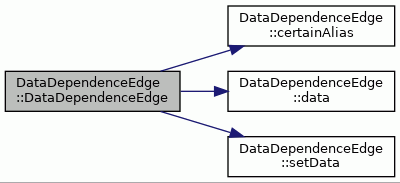
◆ DataDependenceEdge() [2/4]
| DataDependenceEdge::DataDependenceEdge | ( | EdgeReason | edgereason, |
| DependenceType | deptype, | ||
| bool | guard = false, |
||
| bool | certainAlias = false, |
||
| bool | tailPs = false, |
||
| bool | headPs = false, |
||
| int | loopEdge = 0 |
||
| ) |
Constructor.
- Parameters
-
edgereason which kind of data caused this dependence, is it register, memory, operation, ra etc. deptype whether this is real dependence(raw), antidependence(war) or output dependence(waw) guard if this dependence is a guard use. certainAlias if this memory dep is a known to always alias. tailPS whether the tail of the dep is a pseudo data usage headPS whether the head of the dep is a pseudo data usage loopEdge loop iteration depth if the dependence goes over a loop
Definition at line 110 of file DataDependenceEdge.cc.
References assert, certainAlias(), data_, EDGE_REGISTER, edgeProperties_, edgeReason_, EPF_CERTAIN_ALIAS, EPF_GUARD, EPF_HEAD_PSEUDO, EPF_TAIL_PSEUDO, and loopEdge_.

◆ DataDependenceEdge() [3/4]
| DataDependenceEdge::DataDependenceEdge | ( | const DataDependenceEdge & | other | ) |
Copy constructor.
Because of data_ that needs to be deep copied.
Definition at line 146 of file DataDependenceEdge.cc.
References data_, dependenceType_, edgeProperties_, edgeReason_, and loopEdge_.
◆ DataDependenceEdge() [4/4]
| DataDependenceEdge::DataDependenceEdge | ( | const DataDependenceEdge & | other, |
| bool | invertLoop | ||
| ) |
Copy constructor which may modify the loop property
- Parameters
-
other edge to copy @invertLoop whether to invent oop propert 0->1, 1->0
Definition at line 166 of file DataDependenceEdge.cc.
References data_, dependenceType_, edgeProperties_, edgeReason_, and loopEdge_.
◆ ~DataDependenceEdge()
|
inlinevirtual |
Definition at line 75 of file DataDependenceEdge.hh.
References data_.
Member Function Documentation
◆ certainAlias()
|
inline |
Definition at line 103 of file DataDependenceEdge.hh.
References edgeProperties_, and EPF_CERTAIN_ALIAS.
Referenced by DataDependenceEdge(), DataDependenceEdge(), DataDependenceGraph::dotString(), edgeReasonSt(), and operator==().
◆ data()
|
inline |
Definition at line 142 of file DataDependenceEdge.hh.
References data_.
Referenced by DataDependenceGraph::copyDepsOver(), DataDependenceGraph::copyDepsOver(), DataDependenceEdge(), DataDependenceGraph::destRenamed(), DataDependenceGraph::edgeWeight(), DataDependenceGraph::guardRenamed(), operator==(), LiveRangeData::registersAlive(), DataDependenceGraph::renamedSimpleLiveRange(), DataDependenceGraph::sourceRenamed(), toString(), toString(), and BFMergeAndKeepUser::updateEdges().
◆ dependenceType()
|
inline |
Definition at line 88 of file DataDependenceEdge.hh.
References dependenceType_.
Referenced by ResourceConstraintAnalyzer::analyzeRegisterAntideps(), CycleLookBackSoftwareBypasser::bypassNode(), BFRemoveLoopChecksAndJump::checkAliveMove(), BFRemoveLoopChecksAndJump::checkAlivePO(), PreOptimizer::checkGuardReversalAllowed(), CopyingDelaySlotFiller::checkIncomingDeps(), DataDependenceGraph::combineNodes(), DataDependenceGraph::copyDepsOver(), DataDependenceGraph::copyDepsOver(), DataDependenceGraph::destRenamed(), DataDependenceGraph::edgeWeight(), BF2Scheduler::findBypassEdge(), DataDependenceGraph::findLimitingAntidependenceDestination(), DataDependenceGraph::findLimitingAntidependenceSource(), DataDependenceGraph::findLiveRange(), DataDependenceGraph::findLoopIndexInit(), RegisterCopyAdder::fixDDGEdgesInTempReg(), RegisterCopyAdder::fixDDGEdgesInTempRegChain(), RegisterCopyAdder::fixDDGEdgesInTempRegChainImmediate(), DataDependenceGraph::guardRawPredecessors(), DataDependenceGraph::guardRenamed(), PreOptimizer::inverseGuardsOfHeads(), DataDependenceGraph::isLoopInvariant(), DataDependenceGraph::mergeAndKeepSource(), ProgramDependenceGraph::moveDDGedges(), DataDependenceGraph::onlyIncomingGuard(), BFRemoveLoopChecksAndJump::operator()(), DataDependenceGraph::queueRawPredecessors(), LiveRangeData::registersAlive(), DataDependenceGraph::regRawPredecessors(), DataDependenceGraph::regRawSuccessors(), DataDependenceGraph::regWarSuccessors(), DataDependenceGraph::regWawSuccessors(), BFRemoveLoopChecksAndJump::removeMoveFromQueue(), BFRemoveLoopChecksAndJump::removePoFromQueue(), DataDependenceGraph::renamedSimpleLiveRange(), DataDependenceGraph::sanityCheck(), DataDependenceGraph::sourceRenamed(), PreOptimizer::tryToOptimizeAddressReg(), BasicBlockScheduler::tryToOptimizeWaw(), BUBasicBlockScheduler::tryToOptimizeWaw(), and BFMergeAndKeepUser::updateEdges().
◆ depTypeSt()
|
private |
Helper method for creating the toString string.
Definition at line 258 of file DataDependenceEdge.cc.
References DEP_RAW, DEP_UNKNOWN, DEP_WAR, DEP_WAW, and dependenceType_.
Referenced by toString(), and toString().
◆ edgeReason()
|
inline |
Definition at line 91 of file DataDependenceEdge.hh.
References edgeReason_.
Referenced by ResourceConstraintAnalyzer::analyzeRegisterAntideps(), CycleLookBackSoftwareBypasser::bypassNode(), DataDependenceGraph::combineNodes(), DataDependenceGraph::copyDepsOver(), DataDependenceGraph::copyDepsOver(), DataDependenceGraph::destRenamed(), DataDependenceGraph::dotString(), DataDependenceGraph::edgeWeight(), BF2Scheduler::findBypassEdge(), DataDependenceGraph::findLimitingAntidependenceDestination(), DataDependenceGraph::findLimitingAntidependenceSource(), DataDependenceGraph::findLiveRange(), DataDependenceGraph::findLoopIndexInit(), RegisterCopyAdder::fixDDGEdgesInTempReg(), RegisterCopyAdder::fixDDGEdgesInTempRegChain(), RegisterCopyAdder::fixDDGEdgesInTempRegChainImmediate(), DataDependenceGraph::guardRenamed(), isGPREdge(), ExecutionPipelineResource::isLoopBypass(), DataDependenceGraph::isLoopInvariant(), isRegisterOrRA(), ProgramDependenceGraph::moveDDGedges(), DataDependenceGraph::moveFUDependenciesToTrigger(), DataDependenceGraph::queueRawPredecessors(), LiveRangeData::registersAlive(), DataDependenceGraph::regRawPredecessors(), DataDependenceGraph::regRawSuccessors(), DataDependenceGraph::regWarSuccessors(), DataDependenceGraph::regWawSuccessors(), DataDependenceGraph::renamedSimpleLiveRange(), DataDependenceGraph::sanityCheck(), DataDependenceGraph::sourceRenamed(), PreOptimizer::tryToOptimizeAddressReg(), BasicBlockScheduler::tryToOptimizeWaw(), BUBasicBlockScheduler::tryToOptimizeWaw(), and BFMergeAndKeepUser::updateEdges().
◆ edgeReasonSt()
|
private |
Helper method for creating the toString string.
Definition at line 235 of file DataDependenceEdge.cc.
References certainAlias(), EDGE_FUSTATE, EDGE_MEMORY, EDGE_OPERATION, EDGE_RA, EDGE_REGISTER, and edgeReason_.
Referenced by toString(), and toString().

◆ guardSt()
|
private |
Helper method for creating the toString string.
Definition at line 276 of file DataDependenceEdge.cc.
References guardUse().
Referenced by toString(), and toString().

◆ guardUse()
|
inline |
Definition at line 100 of file DataDependenceEdge.hh.
References edgeProperties_, and EPF_GUARD.
Referenced by CycleLookBackSoftwareBypasser::bypassNode(), PreOptimizer::checkGuardReversalAllowed(), CopyingDelaySlotFiller::checkIncomingDeps(), DataDependenceGraph::copyDepsOver(), DataDependenceGraph::copyDepsOver(), DataDependenceGraph::destRenamed(), DataDependenceGraph::edgeWeight(), BF2Scheduler::findBypassEdge(), DataDependenceGraph::findLimitingAntidependenceDestination(), DataDependenceGraph::findLimitingAntidependenceSource(), DataDependenceGraph::findLiveRange(), RegisterCopyAdder::fixDDGEdgesInTempReg(), RegisterCopyAdder::fixDDGEdgesInTempRegChain(), RegisterCopyAdder::fixDDGEdgesInTempRegChainImmediate(), DataDependenceGraph::guardRawPredecessors(), DataDependenceGraph::guardRenamed(), guardSt(), PreOptimizer::inverseGuardsOfHeads(), DataDependenceGraph::isLoopInvariant(), DataDependenceGraph::mergeAndKeepSource(), DataDependenceGraph::onlyIncomingGuard(), operator==(), DataDependenceGraph::queueRawPredecessors(), DataDependenceGraph::sourceRenamed(), PreOptimizer::tryToOptimizeAddressReg(), and BFMergeAndKeepUser::updateEdges().
◆ headPseudo()
|
inline |
returns whether the head of the dependence does not directly write/read the data but instead is a control flow move which may cause it to be read/written
Definition at line 115 of file DataDependenceEdge.hh.
References edgeProperties_, and EPF_HEAD_PSEUDO.
Referenced by CycleLookBackSoftwareBypasser::bypassNode(), DataDependenceGraph::copyDepsOver(), DataDependenceGraph::copyDepsOver(), DataDependenceGraph::destRenamed(), DataDependenceGraph::edgeWeight(), BF2Scheduler::findBypassEdge(), DataDependenceGraph::findLimitingAntidependenceDestination(), DataDependenceGraph::findLimitingAntidependenceSource(), DataDependenceGraph::findLiveRange(), RegisterCopyAdder::fixDDGEdgesInTempReg(), RegisterCopyAdder::fixDDGEdgesInTempRegChain(), RegisterCopyAdder::fixDDGEdgesInTempRegChainImmediate(), DataDependenceGraph::guardRenamed(), operator==(), pseudoSt(), DataDependenceGraph::queueRawPredecessors(), LiveRangeData::registersAlive(), DataDependenceGraph::renamedSimpleLiveRange(), and DataDependenceGraph::sourceRenamed().
◆ isBackEdge()
|
inlinevirtual |
Reimplemented from GraphEdge.
Definition at line 118 of file DataDependenceEdge.hh.
References loopEdge_.
Referenced by CycleLookBackSoftwareBypasser::bypassNode(), DataDependenceGraph::dotString(), DataDependenceGraph::dropBackEdges(), BF2Scheduler::findBypassEdge(), DataDependenceGraph::findBypassSource(), DataDependenceGraph::findLiveRange(), DataDependenceGraph::findLoopIndexInit(), ExecutionPipelineResource::isLoopBypass(), BFEarlyBypasser::operator()(), BFMergeAndKeepUser::operator()(), operator==(), DataDependenceGraph::queueRawPredecessors(), DataDependenceGraph::regRawPredecessors(), BFPostpassBypasser::tryBypassNode(), and PreOptimizer::tryToOptimizeAddressReg().
◆ isFalseDep()
|
inline |
Definition at line 95 of file DataDependenceEdge.hh.
References DEP_WAR, DEP_WAW, dependenceType_, EDGE_OPERATION, and edgeReason_.
Referenced by ResourceConstraintAnalyzer::analyzeRegisterAntideps(), DataDependenceGraph::dotString(), and BFMergeAndKeepUser::operator()().
◆ isGPREdge()
|
inline |
Definition at line 125 of file DataDependenceEdge.hh.
References EDGE_REGISTER, and edgeReason().

◆ isRAW()
|
inline |
Definition at line 138 of file DataDependenceEdge.hh.
References DEP_RAW, and dependenceType_.
◆ isRegisterOrRA()
|
inline |
Definition at line 129 of file DataDependenceEdge.hh.
References EDGE_RA, EDGE_REGISTER, and edgeReason().

◆ isWAW()
|
inline |
Definition at line 134 of file DataDependenceEdge.hh.
References DEP_WAW, and dependenceType_.
◆ latencySt()
Helper method for creating the toString string. Finds out the latency of operation dependences.
Definition at line 294 of file DataDependenceEdge.cc.
References TTAProgram::Move::destination(), EDGE_OPERATION, edgeReason_, TTAProgram::TerminalFUPort::hwOperation(), MoveNode::isAssigned(), TTAProgram::Move::isTriggering(), TTAMachine::HWOperation::latency(), and MoveNode::move().
Referenced by toString().
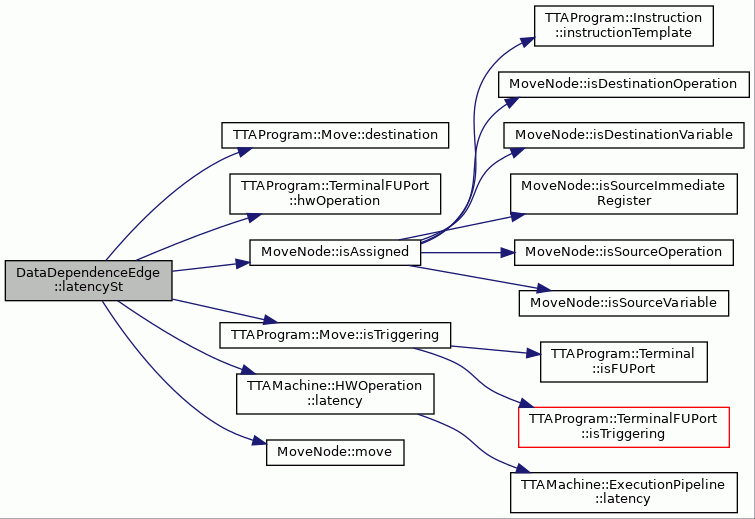
◆ loopDepth()
|
inline |
Definition at line 121 of file DataDependenceEdge.hh.
References loopEdge_.
Referenced by ResourceConstraintAnalyzer::analyzeRegisterAntideps(), DataDependenceGraph::copyDepsOver(), DataDependenceGraph::copyDepsOver(), and DataDependenceGraph::renamedSimpleLiveRange().
◆ operator==()
| bool DataDependenceEdge::operator== | ( | const DataDependenceEdge & | other | ) | const |
Comparator.
Checks whether the two edges are identical.
Definition at line 319 of file DataDependenceEdge.cc.
References certainAlias(), data(), dependenceType_, edgeReason_, guardUse(), headPseudo(), isBackEdge(), and tailPseudo().
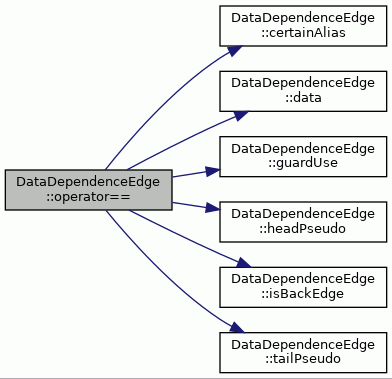
◆ printStats()
|
static |
Prints statistics about the created edges to the given output stream.
Definition at line 191 of file DataDependenceEdge.cc.
References regAntidepCount_.
◆ pseudoSt()
|
private |
Helper method for creating the toString string.
Definition at line 284 of file DataDependenceEdge.cc.
References headPseudo(), and tailPseudo().
Referenced by toString(), and toString().

◆ saveState()
| ObjectState * DataDependenceEdge::saveState | ( | const MoveNode & | tail, |
| const MoveNode & | head | ||
| ) |
State dumping for XML generation.
- Parameters
-
tail source node of the edge head sink node of the edge
Definition at line 345 of file DataDependenceEdge.cc.
References DEP_RAW, DEP_TRIGGER, DEP_UNKNOWN, DEP_WAR, DEP_WAW, dependenceType_, TTAProgram::Move::destination(), EDGE_FUSTATE, EDGE_MEMORY, EDGE_OPERATION, EDGE_RA, EDGE_REGISTER, edgeReason_, TTAProgram::TerminalFUPort::hwOperation(), MoveNode::isMove(), TTAProgram::Move::isTriggering(), TTAMachine::HWOperation::latency(), loopEdge_, MoveNode::move(), GraphNode::nodeID(), ObjectState::setName(), ObjectState::setValue(), and Conversion::toString().
Referenced by DataDependenceGraph::writeToXMLFile().
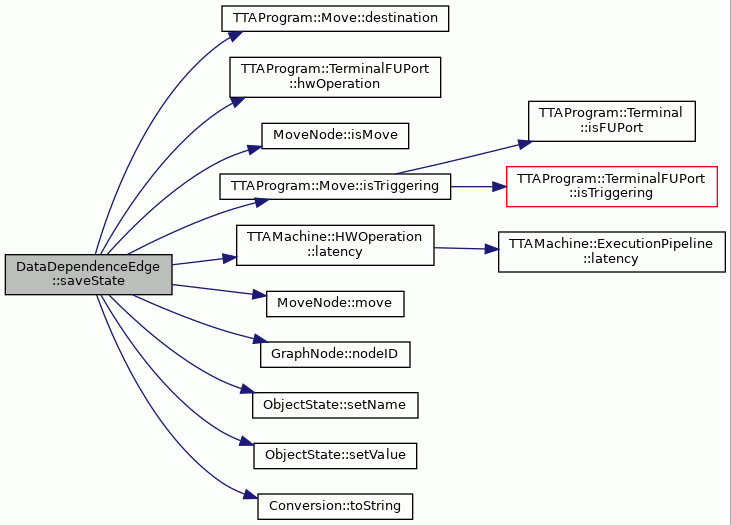
◆ setData()
| void DataDependenceEdge::setData | ( | const TCEString & | newData | ) |
Definition at line 331 of file DataDependenceEdge.cc.
References data_.
Referenced by DataDependenceEdge(), DataDependenceGraph::destRenamed(), DataDependenceGraph::guardRenamed(), and DataDependenceGraph::sourceRenamed().
◆ tailPseudo()
|
inline |
returns whether the tail of the dependence does not directly write/read the data but instead is a control flow move which may cause it to be read/written
Definition at line 109 of file DataDependenceEdge.hh.
References edgeProperties_, and EPF_TAIL_PSEUDO.
Referenced by DataDependenceGraph::copyDepsOver(), DataDependenceGraph::copyDepsOver(), DataDependenceGraph::destRenamed(), DataDependenceGraph::findLimitingAntidependenceDestination(), DataDependenceGraph::findLimitingAntidependenceSource(), DataDependenceGraph::findLiveRange(), RegisterCopyAdder::fixDDGEdgesInTempReg(), RegisterCopyAdder::fixDDGEdgesInTempRegChain(), RegisterCopyAdder::fixDDGEdgesInTempRegChainImmediate(), DataDependenceGraph::guardRenamed(), operator==(), pseudoSt(), DataDependenceGraph::queueRawPredecessors(), LiveRangeData::registersAlive(), DataDependenceGraph::renamedSimpleLiveRange(), DataDependenceGraph::sourceRenamed(), BasicBlockScheduler::tryToOptimizeWaw(), BUBasicBlockScheduler::tryToOptimizeWaw(), and BFMergeAndKeepUser::updateEdges().
◆ toString() [1/2]
|
virtual |
Returns a textual representation of the edge.
This is used in the generated dot files.
Reimplemented from GraphEdge.
Definition at line 201 of file DataDependenceEdge.cc.
References data(), depTypeSt(), edgeReasonSt(), guardSt(), loopEdge_, pseudoSt(), and Conversion::toString().
Referenced by ResourceConstraintAnalyzer::analyzeRegisterAntideps(), DataDependenceGraph::dotString(), BFRemoveEdge::operator()(), ProgramDependenceEdge::toString(), and BFRemoveEdge::undoOnlyMe().
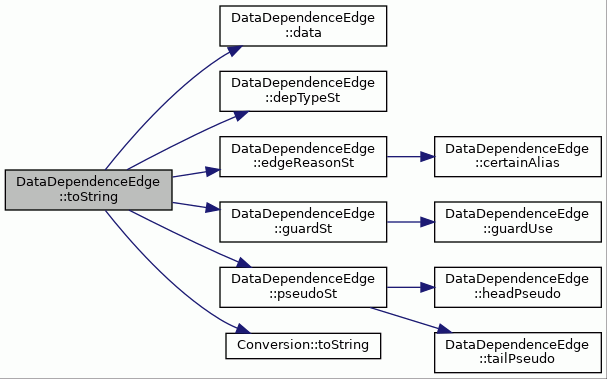
◆ toString() [2/2]
Returns a textual representation of the edge.
- Parameters
-
tail the source node of the dependence. Needed for looking up operation latencies in scheduled code.
- Todo:
- This should be refactored.
This is used in the generated dot files.
Definition at line 221 of file DataDependenceEdge.cc.
References data(), depTypeSt(), edgeReasonSt(), guardSt(), latencySt(), loopEdge_, pseudoSt(), and Conversion::toString().
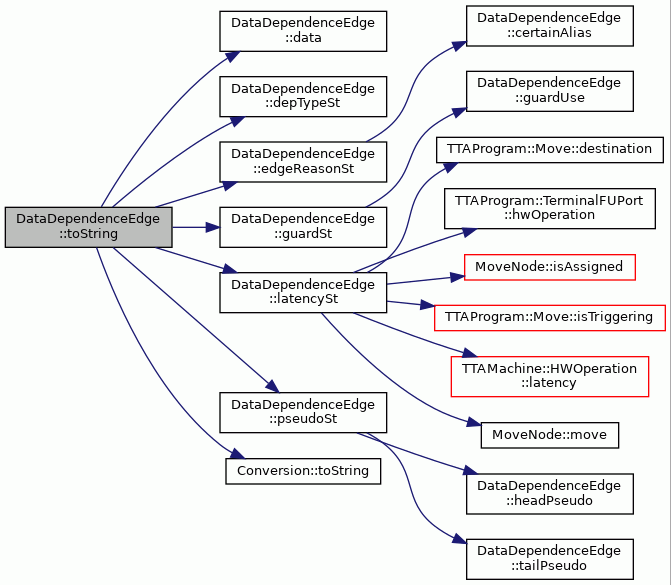
Member Data Documentation
◆ data_
|
private |
Definition at line 181 of file DataDependenceEdge.hh.
Referenced by data(), DataDependenceEdge(), DataDependenceEdge(), DataDependenceEdge(), DataDependenceEdge(), setData(), and ~DataDependenceEdge().
◆ dependenceType_
|
private |
Definition at line 176 of file DataDependenceEdge.hh.
Referenced by DataDependenceEdge(), DataDependenceEdge(), dependenceType(), depTypeSt(), isFalseDep(), isRAW(), isWAW(), operator==(), and saveState().
◆ edgeProperties_
|
private |
Definition at line 178 of file DataDependenceEdge.hh.
Referenced by certainAlias(), DataDependenceEdge(), DataDependenceEdge(), DataDependenceEdge(), DataDependenceEdge(), guardUse(), headPseudo(), and tailPseudo().
◆ edgeReason_
|
private |
Definition at line 177 of file DataDependenceEdge.hh.
Referenced by DataDependenceEdge(), DataDependenceEdge(), DataDependenceEdge(), DataDependenceEdge(), edgeReason(), edgeReasonSt(), isFalseDep(), latencySt(), operator==(), and saveState().
◆ loopEdge_
|
private |
Definition at line 179 of file DataDependenceEdge.hh.
Referenced by DataDependenceEdge(), DataDependenceEdge(), DataDependenceEdge(), DataDependenceEdge(), isBackEdge(), loopDepth(), saveState(), toString(), and toString().
◆ regAntidepCount_
|
static |
Definition at line 154 of file DataDependenceEdge.hh.
Referenced by printStats().
The documentation for this class was generated from the following files: